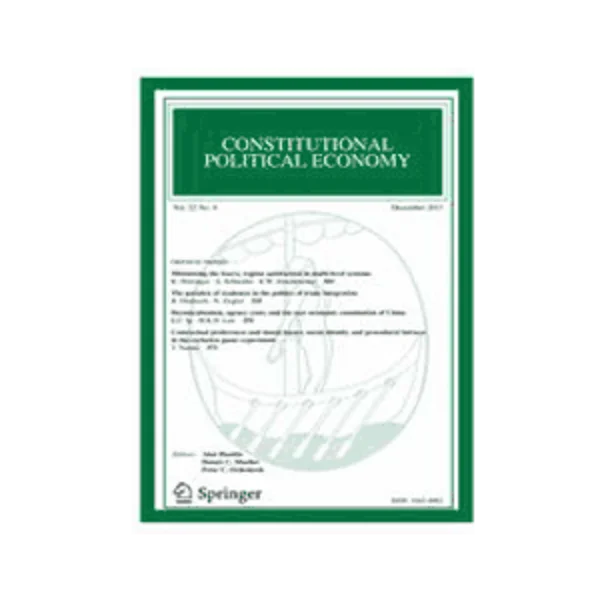-
distributive consideration in institutional change: the case of zia’s islamization policy in pakistan
جزئیات بیشتر مقاله- تاریخ ارائه: 1392/07/24
- تاریخ انتشار در تی پی بین: 1392/07/24
- تعداد بازدید: 1028
- تعداد پرسش و پاسخ ها: 0
- شماره تماس دبیرخانه رویداد: -
institutional change is an interactive process that results from the social interactions of economic actors. several perspectives like ideology, efficiency, or distribution etc. are relevant in studying institutional change. in this paper, the distributive consideration is analyzed and an argument is made in favor of this approach by providing evidence from pakistan’s islamization policy. our analysis shows that zia’s islamization program was motivated by his search for legitimacy, and his rent-seeking interests. domestic legitimacy was achieved through the introduction of islamic clauses in the constitution as it was a popular demand in a state which was already established through a religious rhetoric. the islamization program also helped in attaining international legitimacy as the religious circles informally initiated jihad against soviet union in afghanistan. the islamization policy and jihad, in turn, resulted in windfall gains in the form of us economic and military assistance that led to a voracious rent-seeking in the pakistani society. after the detailed descriptive analysis, we model this situation in two-stage rent-seeking activities. we show how the rent-seeking contest among various interest groups results in institutional change as an equilibrium outcome. our results indicate that pakistan’s islamization program is associated with the parameter shifts in our model.
مقالات جدیدترین رویدادها
-
استفاده از تحلیل اهمیت-عملکرد در ارائه الگوی مدیریت خلاقیت سازمانی و ارائه راهکار جهت بهبود
-
بررسی تاثیر ارزش وجوه نقد مازاد بر ساختار سرمایه شرکت های پذیرفته شده در بورس اوراق بهادار تهران
-
بررسی تأثیر سطح افشای ریسک بر قرارداد بدهی شرکت های پذیرفته شده در بورس اوراق بهادار تهران
-
بررسی تأثیر رتبه بندی اعتباری مبتنی بر مدل امتیاز بازار نوظهور بر نقد شوندگی سهام با تأکید بر خصوصی سازی شرکت ها
-
تأثیر آمیخته بازاریابی پوشاک ایرانی بر تصویر ذهنی مشتری پوشاک ایرانی (هاکوپیان)
-
مقایسه روشهای تحلیل مستقیم و طول مؤثردر طراحی ستونهای قابهای خمشی فولادی
-
بررسی استفاده از روش بیولوژیکی در بهسازی خاکهای گچ دار
-
بررسی نقش خلاقیت در فرایند یاددهی – یادگیری
-
growth and characterization of in x ga1−x n multiple quantum wells without phase separation
-
free vibration analysis of fg nanoplates using quasi-3d hyperbolic refined plate theory and the isogeometric approach
مقالات جدیدترین ژورنال ها
-
مدیریت و بررسی افسردگی دانش آموزان دختر مقطع متوسطه دوم در دروان کرونا در شهرستان دزفول
-
مدیریت و بررسی خرد سیاسی در اندیشه ی فردوسی در ادب ایران
-
واکاوی و مدیریت توصیفی قلمدان(جاکلیدی)ضریح در موزه آستان قدس رضوی
-
بررسی تاثیر خلاقیت، دانش و انگیزه کارکنان بر پیشنهادات نوآورانه کارکنان ( مورد مطالعه: هتل های 3 و 4 ستاره استان کرمان)
-
بررسی تاثیر کیفیت سیستم های اطلاعاتی بر تصمیم گیری موفق در شرکتهای تولیدی استان اصفهان (مورد مطالعه: مدیران شرکتهای تولیدی استان اصفهان)
-
تاثیر سرمایه گذاران نهادی استراتژیک بر رابطه بین محافظه کاری حسابداری و ریسک سقوط قیمت سهام
-
اثربخشی زوج درمانی رفتاری بر نگرش به خیانت و سازگاری زناشویی در زوجین
-
شناسایی و اولویت بندی مسیرهای عمده کسب کسب و کارهای گردشگری مناطق روستایی شهرستان جیرفت با استفاده از عملگرهای فازی
-
تاثیر حضور زنان در کمیته حسابرسی بر کیفیت و حق الزحمه حسابرسی (شواهد تجربی: بورس اوراق بهادار تهران)
-
a review of the ankle joint movement in people with ankle instability




سوال خود را در مورد این مقاله مطرح نمایید :